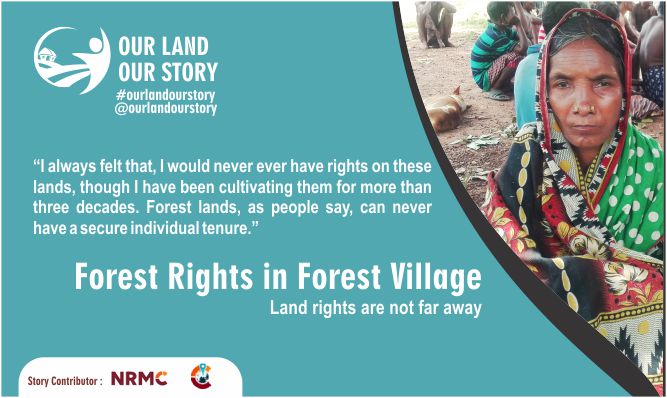
Forest rights in forest village ...
“I always felt that, I would never ever have rights on these lands, though I have been cultivating them for more than three decades. Forest lands, as people say, can never have a secure individual tenure. I felt like any moment these land could be taken over by forest department or others and my children will be landless” says Panchami.
Panchami Jani 55, a tribal woman of and mother of two, lives in a remote non-descrepit village Baramunda, nested in the forested tracts of Boudh district of Odisha. Her late husband Sapteswar Jani was cultivating some lands, after clearing a patch of forest in neighboring Sitkabari village, along with others, for last 30 years.When Sapteswar died 15 years back, Panchami was 40 years; with two children. Sitkabari, continued to remain as a forest village, which as per Indian law is an un-surveyed village with all land de jure belonging to state forest department, devoid of the de facto tenure status. For cultivating these lands in the past, some farmers from Baramunda and Sitkabari were sent to jail as per provisions of India’ Forest Act, earlier.
Panchami, however, worked hard on these parcels for years to eke her living. For some years, she tried share cropping with farmers of Sitkabari, but with fear of losing the land to tenants through long-term share cropping, she stopped that. As a farmer she wanted to secure these lands for her son and upcoming generation. However, she was worried about losing them anytime to government, due to the absence of any kind of recorded rights.
Following enactment of Forest Rights Act (FRA), 2005, her hope to own the land became alive. However, FRA implementation in forest villages were not to be prioritized by states, as the requirements of fresh survey needed more costs and efforts, which was not easily available. Panchami’s hope was fast turning to despair and she was not sure, whether during her life time, she could ever secure tenure over these lands.
Finally her moment, however, came, when learning about the potential of mobile mapping technology, district administration requested FES (Foundation for Ecological Security), which in turn asked NRMC Center for Land Governance to assist the Forest Rights Committee and the Gram Sabha of Sitkabari village to organize the survey for lodging the Individual Forest Rights applications, as per FRA.
Following a brief training, Panchami herself mapped her parcels with Differential Global Positioning System (DGPS) linked mobile application, while another village youth helped her personal information recorded in the application. Subsequently, NRMC-CLG and FES helped Panchami in filling the IFR claim in prescribed form along with geo-referenced parcel and all required personal information.
Panchami was very happy to participate in the mapping process. She says “I have walked around my own parcel in front of the Forest Right Committee and District welfare officer. I felt dignified for have been given that opportunity and also am assured that my parcel is correctly mapped and recognized before the committee and community”.
Panchami and many other forest dwellers of un-surveyed forest villages have been awaiting for long to get a secure tenure over their Land. With prevailing economic and social uncertainty and limitations of state resources, partnership between civil society, non-state actors and use of user-friendly and efficient mobile technology (augmented with DGPS) offer hopes to other Panchamis and similar remotely located communities. Now their land rights are not far away.
This story was submitted by the Center for Land Governance- NRMC
.
